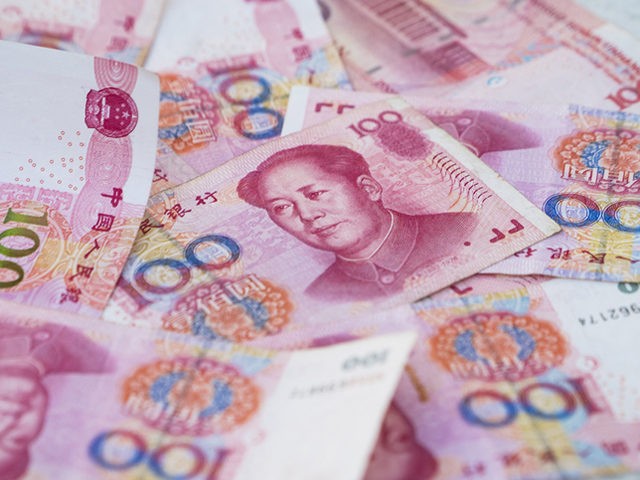The Financial Times (FT) reported on Friday that China’s currency, the renminbi, had its biggest rally in 15 years, driven by increased foreign demand and “rising expectations that a Joe Biden victory in next month’s U.S. presidential election could help reset relations between the two superpowers.”
FT allowed that the big rally might also have been goosed by the National Day holiday in China, which suspended trading from September 30 to October 9. The result was the “onshore” yuan reaching 6.693 against the dollar, its highest value since it was tied to the U.S. dollar in 2005.
China also has a looser “offshore renminbi” that did not suspend trading for the holiday and rose somewhat less in value on Friday.
Much of the rally was attributed to increased foreign demand for Chinese products and increased tourism, as China claims to have fully controlled the Chinese coronavirus pandemic and has rebooted its industrial and service sectors, while the U.S. and much of the Western world is still dealing with coronavirus outbreaks and restrictions on commercial activity. Some analysts suggest China previously tried to keep the renminbi’s value low to encourage trade but is now permitting it to climb so it will be taken more seriously as a medium of international exchange.
Several analysts told FT the currency surge was linked to anticipation that Democrat presidential candidate Joe Biden will win the 2020 presidential election and implement policies favorable to Beijing:
“The view in the market is that the way a Biden administration approaches [U.S.-China relations] is probably going to be less confrontational and certainly using trade less as a tool or weapon against China,” said Daniel Been, head of foreign exchange strategy at ANZ.
[…]
“The higher likelihood of a blue sweep after the first presidential debate opens up room for more renminbi appreciation,” said Lu Sun, a strategist at U.S. bank Citi. “A Biden would likely be positive for the currency, and a Trump win or contested result negative.”
China’s state-run Global Times ran an editorial on Monday that dismissed the United States as a “financial zombie,” crowing that the entire country would be on the verge of bankruptcy if it were treated like a corporation, thanks to its “chaotic governance and high debt.”
The Global Times crowed that China’s coronavirus killed America’s economic strength and left it a shambling zombie, sustained only by soaring levels of debt. Some big U.S. companies have likewise become the walking dead:
In just half a year, the Fed’s balance sheet has increased by $2.89 trillion, an increase of nearly 70 percent – making it almost catch up with the total of the balance sheet growth between 2008 and 2014. The terrible economic situation has gradually plunged the US into an endless loop of “deficits.” And now its fiscal and monetary policies are in a passive state of deficit spending.
Although huge increases in the US dollar supply temporarily alleviated liquidity crises in the financial markets, it also made a US asset bubble that should have been settled to re-expand rapidly. In the long run, this is just a hard time delay. It will eventually lead to a bubble in the US financial markets, with worsening results.
According to data compiled by Deutsche Bank Securities, nearly one in every five publicly traded US companies is a “zombie,” this is double the amount compared with figures in 2013. The Fed’s continued monetary policy support only serves to prolong the survival of American companies that should have gone bankrupt.
The Global Times glimpsed the final victory of authoritarian collectivism over free-market capitalism and democracy in the aftermath of the Wuhan pandemic.
“Under the impact of the financial crisis in 2008 and the COVID-19 pandemic in 2020, the so-called myths of U.S. styled democracy, wealth, and values are shattering,” the Chinese Communist paper gloated.
“It is not certain whether the US is bound to go bankrupt. But it can at least be said that the rapid fall of the US into the abyss of ‘financial zombification’ under the COVID-19 pandemic is well underway. One can see that major changes in the relationship between capital and technology are at a major ‘historical crossroad,’” the editorial concluded.

COMMENTS
Please let us know if you're having issues with commenting.